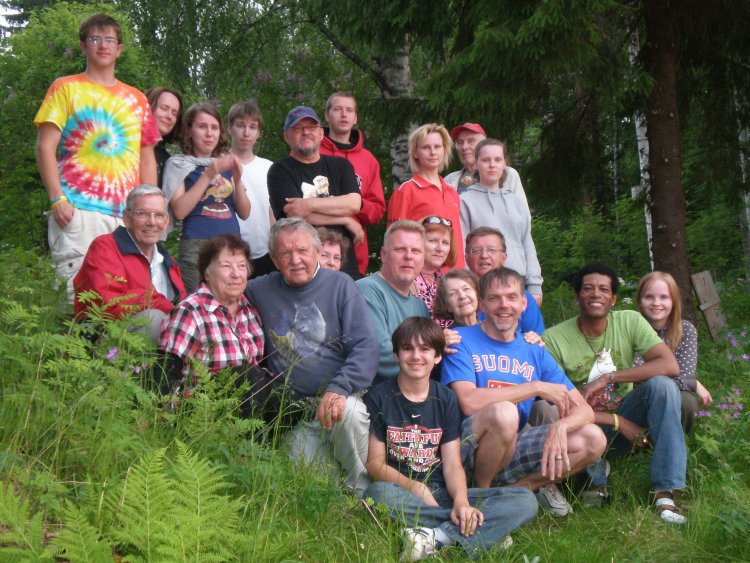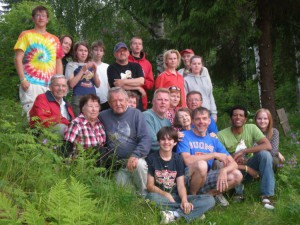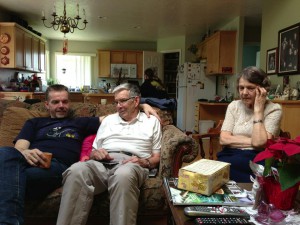Parents / Allies

By John Gustav-Wrathall

With extended family, our foster son Glen standing behind my dad (in the upper left corner), my husband and I (kneeling front row center) in front of my mom, surrounded by loving cousins, uncles and aunts
When I came out in the 1980s, it seemed like the normal experience for LGBT people was extreme family rejection. I don’t know if statistically valid studies were done in that era on the typical attitudes of American families toward their LGBT sons or daughters. What I do know was that it seemed that the majority of my LGBT friends who were out to their families tended to experience some form of alienation from their families or tension with their families. They didn’t go home for the holidays because they (or their significant others) were not welcome. They didn’t communicate often with their families, and when they did, communication was terse and difficult.
The horror stories were all too common. Many could tell stories of being kicked out of their homes or being disowned. Someone I knew through “Lutherans Concerned” (now “Reconciling Works”) lost his partner to AIDS, was kicked out of his apartment by his deceased partner’s family, and was told he had no right to keep anything that had belonged to his partner. Two friends of mine who died from AIDS-related complications died without family involved in their care or being close by or present when they passed away. For many LGBT individuals of that era, it was taken for granted coming out meant exile from biological family. The LGBT community often had to become a kind of surrogate family.
When I came out to my devout LDS parents in 1989, I expected outright rejection, but rejection was not what I experienced. The first words out of my dad’s mouth after I had sat down with him and my mom and told them my coming out story was, “We feel terrible that we never knew what you were going through. We feel terrible that you almost committed suicide, and we weren’t able to be there to help you through that.” My mom later told me that as they were taking me back to the airport after my “coming out” visit, the Holy Spirit spoke to her in an audible voice, telling her that I was OK. Mom said that after that she knew that her only job was to love me unconditionally and support me. There was a period of time when my dad wrestled to make sense of things, but one night he called me on the phone and told me he was convinced, after much study and prayer, that Jesus had acknowledged that some are born gay (Matthew 19:12), and that someday the Church would receive fuller revelation on this subject. My husband was always welcome in my parents home, and they soon claimed him as their own son. They (and my devout LDS grandmother) attended our non-legal “commitment ceremony” in 1995 (Dad read a scripture as part of the ceremony). When we got legally married in 2008 in Riverside, CA, they insisted on being there.
I couldn’t have asked for more loving or supportive parents. When I told friends of mine in the gay community how my parents had responded to my coming out, they invariably expressed surprise and envy. You just didn’t expect that kind of reaction from families. The fact that they were Mormon made it even more surprising to my non-Mormon friends, though to me it was evident how my parents’ Mormon-ness was very much interwoven with their response. Their spirituality — their confidence in their ability to seek and receive guidance directly from God — and their commitment to family — based on temple covenants — were what drove their acceptance of me. I know of many other LGBT Mormons whose experience has been similar.
I felt lucky. But I shouldn’t have had to feel lucky. And while I would like to be able to say that family acceptance is the norm among LGBT Mormons, it unfortunately is not. I’m still not sure if any statistically reliable research has been done on the percentage of Mormon families who are accepting vs. rejecting of their LGBT kids, and what kinds of family acceptance or rejection LGBT Mormons face. But we know that family rejection is a huge problem among Mormons.
One recent blog post by Lori Burkman on “When Religion Creates Dragons” discusses the “Mama Dragon” phenomenon, parents (specifically mothers) who have rallied to fiercely defend their gay kids in the face of rejection from their religious communities. She specifically mentions the escalating problem of LGBT youth homelessness in Utah, disquieting evidence of family rejection by devout Mormons. Lori noted:
It is clear that “loving the sinner and hating the sin” is pretty much the worst way to love someone. Instead we need to love the sinner (realizing we are all sinners) and only hate our own sin. There is no cause to judge or reject others for homosexuality when truly, its nature and purpose here on earth is beyond any of our comprehension. Everyone is free to come to their own personal conclusions on the sinful or nonsinful nature of homosexuality, but in no way is it anyone’s right to project limiting beliefs on others.
The full post is available here:
http://www.nomorestrangers.org/when-religion-creates-dragons/
Caitlyn Ryan, a San Francisco State University-based researcher is well-known by now in the LGBT Mormon community. Among some of the more significant findings of Caitlyn’s research is that even moderately accepting behavior on the part of families can make a huge difference. Caitlyn wrote in an article recently published in the Washington Post:
Parents and families can support their LGBT child — even if they believe that being LGBT is wrong — by simple actions that don’t require them to accept a “behavior” or “identity” they don’t condone. This includes talking with their child respectfully to begin to understand their child’s experiences; requiring that other family members respect their child even if they disagree; and advocating for their child when others mistreat them. These behaviors also reflect key religious values of respect, mercy and compassion.
The full article is available here:
In my own experience as a moderator of Affirmation’s Prepare group — a Facebook group for LDS-Church-active LGBT individuals — family acceptance seems to be a common factor in LGBT individuals’ willingness to engage with their faith, even in the face of adversity. I suspect that parents who hope for their LGBT kids to stay engaged with the faith will best be served by letting go of outcomes and focusing on unconditional love and acceptance.
It seems odd for us to apply the term “allies” to parents. In a normal world, every child simply assumes that their fiercest, most loving defenders are and will always be their parents. The term “parent” ought to be synonymous with “ally.” Unfortunately, we don’t necessarily live in a world where that can automatically be assumed. In the meantime, we are deeply grateful to parents who — sometimes quietly, sometimes boisterously — stand by our sides and let us know through action and through words that family matters, and that we are family.
